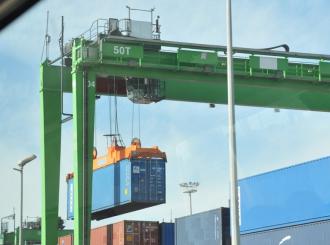
Rabat, 5 December 2015 (ECA): The Economic Commission for Africa (Office for North Africa) organized, in partnership with the Arab Maghreb Union (UMA) and the Economic and Social Commission for Western Asia (ESCWA) a workshop under the theme “Harmonizing Customs Procedures and the Customs to Customs Exchange of Electronic Documents”, on 2-4 December 2015 in Casablanca.
This event was organized as part of “Strengthening the capacities of developing countries and countries with economies in transition to facilitate legitimate border crossing, regional cooperation and integration”, a project approved by the United Nations General Assembly in December 2011 and coordinated by the UN Economic Commission for Europe (UNECE) in partnership with several sister organizations including ECA and ESCWA.
This workshop aimed to help increase the secure electronic exchange of information between customs administrations in developing countries and countries with economies in transition, which includes the set up of a Customs to Customs (C2C) document exchange platform to facilitate goods transfers at frontiers, step up the cooperation between customs administrations and promote the use of international standard electronic messages, especially for transit operations.
As part of this project, experts have carried out preliminary assessments in two North African countries - Morocco (as an African country) and Tunisia (as an Agadir Agreement country)– to link their customs systems with a customs to customs exchange platform. Their aim is to encourage other countries to do the same and achieve the global computerization of transit operations.
“This debate on the cross-border exchange of customs information will not only help streamline border crossing procedures, it will also help improve risk management”, said Nassim Oulmane, Acting Director of the ECA’s office in North Africa.
This workshop also comes in support to actions undertaken by Arab Maghreb Union and Arab League countries to facilitate goods transfers at customs.
Although these countries have signed several free trade agreements over the last few years, their implementation on the ground strongly depends on how efficiently goods are transferred from one country to another.
“In Arab countries, customs duties account for only 5 to 10% of trade costs, while customs procedures and other non tariff barriers cost the equivalent of a 30 to 40% tax. Over the last few years, countries across the region have mainly negotiated lower tariffs but little has been done to reduce non tariff measures (NTMs) which are the main obstacle to trade”, said Mr Mohamed Chemingui, head of the Regional Integration section at ESCWA. “Signing free trade agreements is not enough: trade between countries should also be facilitated on the ground, at the customs level”, added Reda El Merini, Director of Economic Affairs at the General Secretariat of the Arab Maghreb Union.
During this workshop, participants analyzed obstacles to customs harmonization in North Africa and Arab countries and existing technical and legal gaps in electronic document exchanges between customs in the Maghreb region. They also shared their experiences and practices in the transfer from paper to electronic customs procedures and examined various examples including ASEAN’s experience in customs harmonization Senegal’s experience in setting up of the World Customs Organization Data model.
At the end of the meeting, the experts unanimously agreed on the need to set up a pilot project for the electronic exchange of data between customs administrations. This pilot model will be based on the accomplishments of Agadir Agreement countries in customs harmonization, and, by the end of the pilot experiment, should facilitate the technical integration of other States.
Issued by:
Communication Team
Economic Commission for Africa
Office for North Africa
Tel: +212 (0) 537 548 749
Email: hfilali-ansary@uneca.org;cea.an.coms@gmail.com